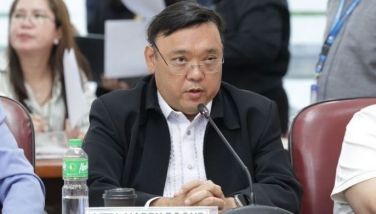NBI forms task force to probe rice smuggling
MANILA, Philippines - A task force was formed by the National Bureau of Investigation (NBI) to investigate reports of alleged rice smuggling in the country.
Officials revealed the task force was formed to widen the scope of the NBI probe.
The task force is composed of the NBI’s anti-graft division and its regional office in Metro Manila.
Sources revealed the task force held its first conference on Thursday.
Officials explained the task force was a joint venture of forces in the NBI. “We have limited manpower in our units,†one official said.
Justice Secretary Leila de Lima ordered the NBI to reopen the probe into the alleged rice smuggling activities in different ports in the country.
The order stemmed from the findings of the Senate that recommended the prosecution of suspected rice smuggler David Tan, along with other personalities involved in the illegal activity.
The Senate committee on agriculture named Danny Ngo, Danilo Garcia and Willy Sy as alleged rice smugglers.
In 2010, several rice smuggling incidents were reported nationwide, such as at Subic Bay Freeport where large rice shipments were seized.
Some officials of the National Food Authority (NFA) were questioned, including a former tourism official who allegedly brokered for the traders wanting to bring the shipment out.
During the administration of former President Gloria Macapagal-Arroyo, it was alleged the NFA over-imported rice, a lot of which ended up rotting in warehouses.
The Commission on Audit (COA) has initiated a fraud audit of the NFA.
COA Chairman Grace Pulido-Tan told the Senate on Thursday that the audit would cover transactions of the NFA in the last five to seven years.
Tan said the COA reviewed its audit reports on the NFA for the past few years and saw “some badges of fraud,†prompting state auditors to take a closer look.
In conducting the fraud audit, Tan said the COA took into consideration the current congressional inquiry on the rice smuggling issue.
Tan said a fraud audit is undertaken by the COA once it sees that irregularities might have been committed.
During a recent hearing conducted by the House committee on agriculture, Anakpawis party-list Rep. Fernando Hicap alleged the NFA issued import permits to rice traders linked to smuggling activities.
He claimed that rice smuggling “happened with government consent.â€
The militant group Kilusang Magbubukid ng Pilipinas (KMP) also claimed that Agriculture Secretary Proceso Alcala made it appear that rice smugglers operate underground when they were actually issued import permits.
The Department of Agriculture (DA), on the other hand, denied allegations of collusion with supposed rice smugglers.
“The Department of Agriculture strongly condemns rice smuggling and the people who engage in this form of economic sabotage,†the department said in a statement yesterday.
“We at the DA likewise deny all allegations or insinuations about the supposed inaction and involvement of DA and the National Food Authority in these illegal activities,†it added.
The DA said Alcala has pursued the national goal of rice self-sufficiency.
“He has implemented programs to increase the productivity and incomes of small producers. Hence, he has consistently opposed the illegal entry of agricultural commodities,†the agency said.
The agriculture department said it will continue to institute reforms “to make the government’s rice importation program truly transparent.â€
Allocation hike
The NFA said it will increase the allocation for accredited rice outlets in areas in Manila, San Juan and Quezon City that are prone to sudden spikes in rice prices.
From the present daily allocation of 25 50-kilogram bags, the NFA is increasing this to 50 50-kilogram bags per day for NFA-accredited outlets inside markets.
For rice outlets outside markets, the NFA is increasing the allocation to 20 50-kilogram bags a day from 10 50-kilogram bags each.
“This is being done to augment the presence of cheap rice in the market so consumers will have access to the cheaper staple,†the NFA said in a statement.
The NFA said it regularly conducts market monitoring activities nationwide to ensure that good quality and affordable rice is available to consumers.
The agency is also expected to begin distributing brown rice and corn grits this year to help diversify the grain consumption of Filipinos and ease pressure on white rice production.
Meanwhile, a consumer group underscored yesterday the need for a thorough review of the government’s rice importation policies and procedures.
In a statement, Action for Consumerism and Transparency for Nation Building (ACTION) reiterated that no less than the country’s food supply and the interests of the country’s rice farmers are at stake.
“A re-examination of the government’s regulatory policies towards the importation of rice is clearly overdue. Unless the legal loopholes are plugged, legitimate importers will be at the mercy of the whims of some government officials tailoring their interpretation of the law according to their own agenda/gains,†Ryann Baccay, director of ACTION said.
The group added “the review should include the NFA’s allowable rice imports in the country under the quantitative restriction (QR) quotas of the government, the private sector quota, the government to government rice trade, but should also recognize the rights, as well as, opportunities given to farmers’ cooperatives to import rice.â€
Because of the volume of imports which needs huge capital, farmer cooperatives since year 2003 are forced to look for financiers or investors to avail of the earning opportunities via rice importations, or worse, sell their import quota.
“This system which was allowed and encouraged to flourish for more than a decade, by no less than the government has attracted some legitimate businessmen forging agreements with some farmer cooperatives. However, it has also been subject to abuse by smuggling syndicates,†ACTION said. – With Czeriza Valencia, Evelyn Macairan
- Latest
- Trending






























